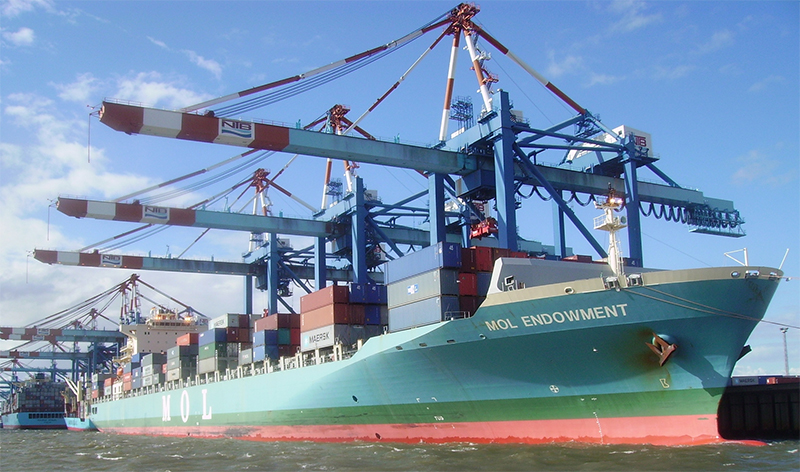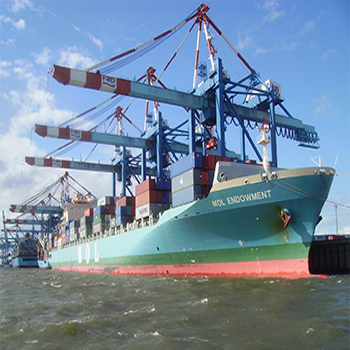Mitsui O.S.K. Lines Restructures with $1.45bn Loss

Despite reporting a nine-month profit of $110.22m, Mitsui OSK Lines (MOL) is forecasting a full loss of $1.45bn for the year ended 31 March 2016 as it undertakes structural reform of its container shipping and dry bulk businesses.
As reported by The Loadstar, Japan’s Mitsui OSK Lines (MOL) is forecasting a massive $1.45bn loss for its fiscal year ending 31 March, after deciding to take the full hit of its dry bulk and container shipping restructuring into its fourth-quarter results.
It said that it wanted to “address the abruptly changing business climate” by withdrawing from certain sectors of the dry bulk market and taking steps to rationalize its container business, particularly on north-south routes.
“As soon as the details of each measure are determined, the company will separately announce them in accordance with timely disclosure rules,” it said in a statement.
These changes are likely to happen promptly, given that MOL wants to swallow the financial pain in its current financial year, rather than carrying it forward.
MOL further commented, “In the dry bulker business, the market is deteriorating to a new record low due to the imbalance of fleet supply and demand, along with stagnant cargo trade resulting from the slowdown in China’s economy since last fall.
“Regarding the container ship business, cargo volume, mainly for Europe and emerging countries, hovered at low levels while a succession of new building vessels came into service, keeping freight rates at historic lows.”
In the dry bulk sector the company said it would be further reducing the number of capesize vessels it has trading in the spot market, and withdraw from offering excess tonnage in the panamax sector and other smaller sizes of bulkers. “Instead, the company will focus on meeting the major transportation demands of our customers,” it said.
In its container ship business MOL said it would focus on trying capture more profitable cargoes, rationalization of services mainly on the north - south trades, and reductions in the fleet focused on mid-sized vessels.
Maersk CEO Says Container Volumes Are Improving in 2016
As reported by Bloomberg, container volumes have picked up this year after the market suffered from sluggish growth and overcapacity in 2015, according to the chief executive officer of A.P. Moeller-Maersk A/S.
“At the beginning of this year, things look a little bit better,” Nils Smedegaard Andersen said in an interview. “We do expect the Asia to Europe business to develop better this year.”
Maersk’s container line, the world’s largest, suffered last year from a toxic cocktail of too many vessels just as global trade sagged. While the industry still needs to address overcapacity, the demand side looks better, Andersen said.
“We find it difficult to believe that the European trade will continue to be negative in 2016,” the CEO said, speaking at the World Economic Forum in Davos, Switzerland. “A competitive euro and very low energy prices are good for the European economy so Europe should start to pick up consumption-wise this year.”
Maersk also has the ability to withstand continued low oil prices, and “would have no problems” if crude remains below $30 a barrel for the rest of the year, Andersen said. “We are really well positioned for the future. We have a very strong balance sheet.”
“Fundamentally, there are a lot of good things going on in the global economy,” Andersen said.
Photo: Container ship MOL Endowment, courtesy of Wikimedia Commons.
Amazon’s New Status as an Ocean Freight Forwarder

Article Topics
Federal Maritime Commission News & Resources
U.S. House passes the Ocean Shipping Reform Act, with Biden set to sign it into law DOJ and FMC intend to continue partnership focused on fair competition in ocean shipping sector Ocean Shipping Reform Act of 2021 is passed by U.S. House of Representatives White House executive order ‘encourages’ freight rail and ocean sectors to make changes FMC leadership calls on the White House for maritime worker vaccinations FMC urges Congressional leaders to address port terminal needs During COVID-19 Maritime supply chain concerns are voiced by the Federal Maritime Commission More Federal Maritime CommissionLatest in Transportation
Talking Supply Chain: Doomsday never arrives for Baltimore bridge collapse impacts Amazon Logistics’ Growth Shakes Up Shipping Industry in 2023 Nissan Channels Tesla With Its Latest Manufacturing Process Why are Diesel Prices Climbing Back Over $4 a Gallon? Luxury Car Brands in Limbo After Chinese Company Violates Labor Laws The Three Biggest Challenges Facing Shippers and Carriers in 2024 Supply Chain Stability Index: “Tremendous Improvement” in 2023 More Transportation













